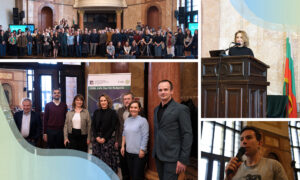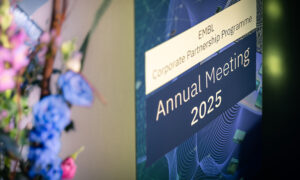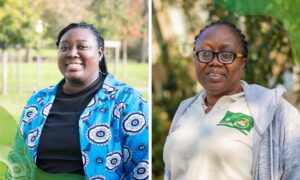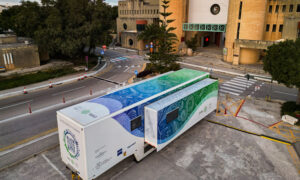
Promoting EMBL opportunities for the Danish scientific community
The DANEMO symposium introduced the new EMBL programme ‘Molecules to Ecosystems’ to scientists in Denmark
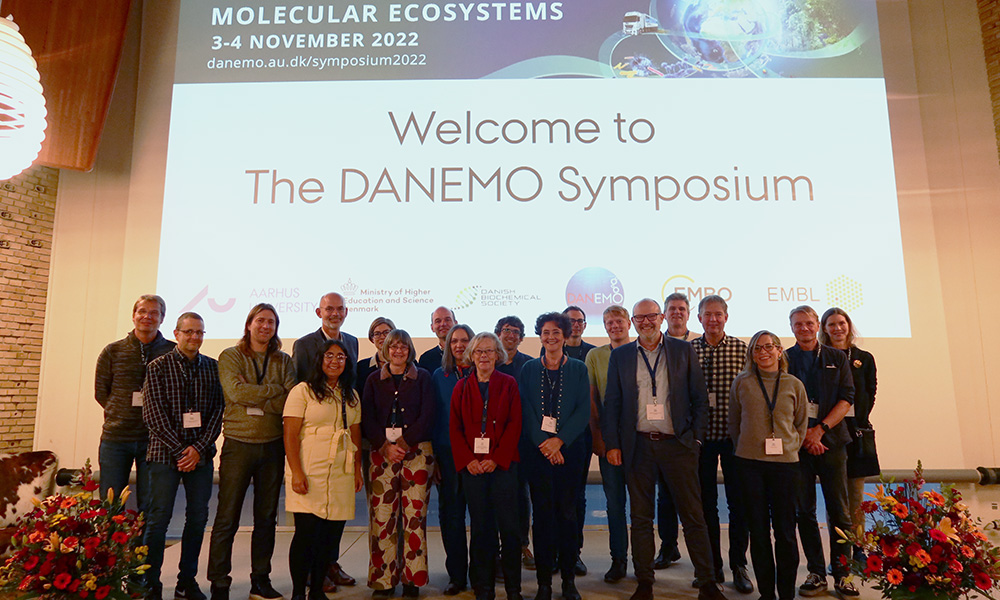
How can the Danish scientific community benefit from their association with EMBL and engage with EMBL’s new programme ‘Molecules to Ecosystems’? The answers to these questions were the focus of the DANEMO symposium organised at the Aarhus University in Denmark from 3-4 November.
Denmark is a founding member of both EMBL and EMBO. The Danish Research Institute of Translational Neuroscience (DANDRITE) is the Danish node of the Nordic EMBL Partnership for Molecular Medicine and has a long tradition of closely cooperating with EMBL. In 2021, the Danish Ministry for Research and Higher Education launched DANEMO in collaboration with the Danish universities as a communication platform and research support initiative. It aims to draw the attention of scientists and students in Denmark to the numerous opportunities at EMBL and EMBO, especially among those communities that haven’t previously interacted with these organisations. DANEMO as a support and information center will rotate among the co-founding universities in Denmark and with the first two years at Aarhus University, hosted by DANDRITE.
At EMBL, DANEMO’s mission is to attract more Danish applicants to predoc, postdoc, and group leader positions and the ARISE programme, stimulate collaborations with EMBL research groups, as well as to inform the Danish scientific community about EMBL’s scientific services and core facilities.
The main focus of the DANEMO symposium was to raise awareness of EMBL’s new programme ‘Molecules to Ecosystems’ and the diverse opportunities that it offers.
The symposium took place at the Aarhus University aula, and rector Brian Bech Nielsen and head of Department of Molecular Biology and Genetics, Erik Østergaard presented welcome addresses together with Poul Nissen, the founding director of DANEMO and director of DANDRITE.
EMBL Director General Edith Heard then opened the symposium with a general introduction to the new programme. There were also several scientific presentations by EMBL researchers across all sites and transversal themes.
The event, including talks by EMBL, EMBO and Danish researchers, brought together around 120 participants from around Denmark and from different EMBL sites, and inspired many discussions on possible new ways of collaboration and scientific services. The thematic sessions covered topics from EMBL’s new research areas, such as microbial, human and planetary ecosystems, as well as new scientific services, including those involving biological imaging. Similar symposia, planned for the future, will span different topics relevant to the Danish research community, as well as various EMBL and EMBO activities.
Spreading the word in the Danish community
In this video, two of the organisers of the symposium Poul Nissen, Director of DANDRITE, and Karen Bech-Pedersen, Communications Coordinator, DANEMO, explain the motivations behind launching DANEMO and the goals of the symposium. They welcome all Danish universities and life science-industries to join the DANEMO community.
Studying life in context and across disciplines
Lone Gram conducts research on bacterial eco-physiology and biotechnology at the Technical University of Denmark. She’s interested in how certain molecules mediate interactions within bacterial communities and between bacteria and other organisms. She sees immense value in facilitating connections between the Danish scientific community and closer contact with EMBL and EMBO.
Understanding the big global ecological challenges
Danish macroecologist and biogeographer Jens-Christian Svenning shares his views on the Planetary Biology transversal theme in the EMBL programme ‘Molecules to Ecosystems’. He explains how EMBL’s mechanistic molecular perspective can contribute to a better understanding of ecosystems and to addressing global challenges, such as the biodiversity crisis and impacts of climate change on ecosystems.
Many techniques in one place
After doing his PhD at the Aarhus University, Danish structural biologist Rasmus Jensen moved to EMBL Heidelberg for his postdoc. As a speaker at the DANEMO symposium, he hoped to inspire scientists in Denmark to use the diverse methods he and others developed at EMBL. Listen to his story to learn how young researchers in Denmark can benefit from EMBL and EMBO.
DANEMO Travel Awards for early career scientists
To attend the DANEMO Symposium, Christina Overgaard, a predoc at the Aalborg University, applied for and received a DANEMO Travel Award. Here, she explains how such travel awards and the possibility of attending events like this support young scientists in their career. She also received a poster prize at the symposium, which was sponsored by the Danish Biochemical Society.
